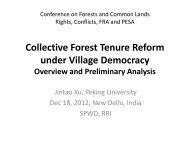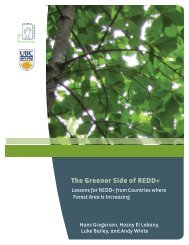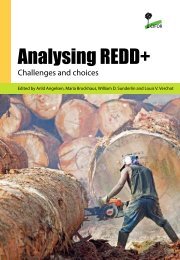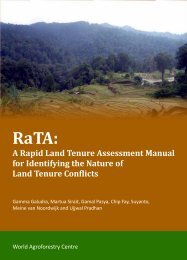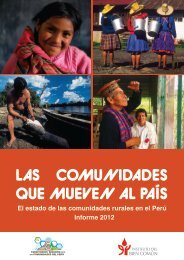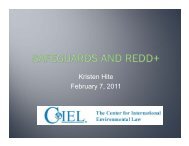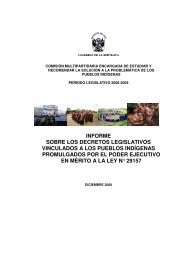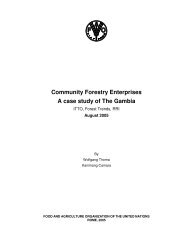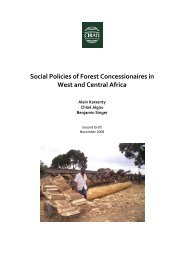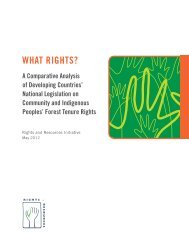- Page 1 and 2:
Sustainable Development Institute /
- Page 3 and 4:
About the Author Liz Alden Wily (Ph
- Page 5 and 6:
Contents Summary 11 Liberia, once a
- Page 7 and 8:
4.3 The Property Law - unclear and
- Page 9:
Chapter 5 So which way forward 251
- Page 12 and 13:
Liberia
- Page 14 and 15:
‘So who owns the forest’ Map 2
- Page 16 and 17:
‘So who owns the forest’ photo
- Page 18 and 19:
‘So who owns the forest’ 18 pho
- Page 20 and 21:
‘So who owns the forest’ landow
- Page 22 and 23:
‘So who owns the forest’ Map 4
- Page 24 and 25:
‘So who owns the forest’ 1956)
- Page 26 and 27:
‘So who owns the forest’ 26 pho
- Page 28 and 29:
‘So who owns the forest’ world.
- Page 30 and 31:
‘So who owns the forest’ Map 6
- Page 32 and 33:
‘So who owns the forest’ Recogn
- Page 34 and 35:
‘So who owns the forest’ 34 pho
- Page 36 and 37:
‘So who owns the forest’ nities
- Page 38 and 39:
‘So who owns the forest’ Map 9
- Page 40 and 41:
40 ‘So who owns the forest’
- Page 42 and 43:
‘So who owns the forest’ 42 Ind
- Page 44 and 45:
44 ‘So who owns the forest’
- Page 46 and 47:
46 ‘So who owns the forest’
- Page 48 and 49:
‘So who owns the forest’ 48 pho
- Page 50 and 51:
‘So who owns the forest’ The ur
- Page 52 and 53:
‘So who owns the forest’ Table
- Page 54 and 55:
‘So who owns the forest’ As exp
- Page 56 and 57:
‘So who owns the forest’ 56 pho
- Page 58 and 59:
‘So who owns the forest’ Yet mo
- Page 60 and 61:
‘So who owns the forest’ Box 2
- Page 62 and 63:
‘So who owns the forest’ 2 Land
- Page 64 and 65:
‘So who owns the forest’ show t
- Page 66 and 67:
‘So who owns the forest’ Box 3,
- Page 68 and 69:
‘So who owns the forest’ Findin
- Page 70 and 71:
‘So who owns the forest’ Box 5
- Page 72 and 73:
‘So who owns the forest’ It is
- Page 74 and 75:
‘So who owns the forest’ Box 7
- Page 76 and 77:
‘So who owns the forest’ French
- Page 78 and 79:
‘So who owns the forest’ in cha
- Page 80 and 81:
‘So who owns the forest’ the co
- Page 82 and 83:
‘So who owns the forest’ An asi
- Page 84 and 85:
‘So who owns the forest’ 3.1 Ad
- Page 86 and 87:
‘So who owns the forest’ On the
- Page 88 and 89:
‘So who owns the forest’ hand u
- Page 90 and 91:
‘So who owns the forest’ Box 8
- Page 92 and 93:
‘So who owns the forest’ Box 9
- Page 94 and 95:
‘So who owns the forest’ Table
- Page 96 and 97:
‘So who owns the forest’ Conser
- Page 98 and 99:
98 ‘So who owns the forest’
- Page 100 and 101:
‘So who owns the forest’ 100 ph
- Page 102 and 103:
‘So who owns the forest’ 2 Cust
- Page 104 and 105:
‘So who owns the forest’ 9. The
- Page 106 and 107:
‘So who owns the forest’ Box 10
- Page 108 and 109:
‘So who owns the forest’ a land
- Page 110 and 111:
‘So who owns the forest’ 3.3 Th
- Page 112 and 113:
‘So who owns the forest’ The nu
- Page 114 and 115:
‘So who owns the forest’ Box 13
- Page 116 and 117:
‘So who owns the forest’ Endors
- Page 118 and 119:
‘So who owns the forest’ Box 15
- Page 120 and 121:
‘So who owns the forest’ Tribal
- Page 122 and 123:
‘So who owns the forest’ 122 Ad
- Page 124 and 125:
‘So who owns the forest’ In the
- Page 126 and 127:
‘So who owns the forest’ Many c
- Page 128 and 129:
‘So who owns the forest’ Table
- Page 130 and 131:
‘So who owns the forest’ Box 18
- Page 132 and 133:
‘So who owns the forest’ that w
- Page 134 and 135:
‘So who owns the forest’ The Co
- Page 136 and 137:
‘So who owns the forest’ Box 20
- Page 138 and 139:
‘So who owns the forest’ That t
- Page 140 and 141:
‘So who owns the forest’ may be
- Page 142 and 143:
‘So who owns the forest’ Energy
- Page 144 and 145:
‘So who owns the forest’ Access
- Page 146 and 147:
‘So who owns the forest’ A surp
- Page 148 and 149:
‘So who owns the forest’ been f
- Page 150 and 151:
‘So who owns the forest’ 150 ph
- Page 152 and 153:
‘So who owns the forest’ Table
- Page 154 and 155:
‘So who owns the forest’ in the
- Page 156 and 157:
‘So who owns the forest’ Totaqu
- Page 158 and 159:
‘So who owns the forest’ A key
- Page 160 and 161:
‘So who owns the forest’ Table
- Page 162 and 163:
‘So who owns the forest’ in Nim
- Page 164 and 165:
‘So who owns the forest’ 1.3 Co
- Page 166 and 167:
‘So who owns the forest’ Table
- Page 168 and 169:
‘So who owns the forest’ cannot
- Page 170 and 171:
‘So who owns the forest’ 2.3 Th
- Page 172 and 173:
‘So who owns the forest’ 3 The
- Page 174 and 175:
‘So who owns the forest’ 3.2 Fa
- Page 176 and 177:
‘So who owns the forest’ Table
- Page 178 and 179:
‘So who owns the forest’ Table
- Page 180 and 181:
‘So who owns the forest’ Common
- Page 182 and 183:
‘So who owns the forest’ Rarely
- Page 184 and 185:
‘So who owns the forest’ - No n
- Page 186 and 187:
‘So who owns the forest’ any on
- Page 188 and 189:
‘So who owns the forest’ - Daug
- Page 190 and 191:
‘So who owns the forest’ abuse,
- Page 192 and 193:
‘So who owns the forest’ Many y
- Page 194 and 195:
‘So who owns the forest’ 5 Land
- Page 196 and 197:
‘So who owns the forest’ mandat
- Page 198 and 199:
‘So who owns the forest’ Box 25
- Page 200 and 201:
‘So who owns the forest’ The Gr
- Page 202 and 203:
‘So who owns the forest’ “Thi
- Page 204 and 205:
‘So who owns the forest’ or cit
- Page 206 and 207:
‘So who owns the forest’ new ca
- Page 208 and 209:
‘So who owns the forest’ of cla
- Page 210 and 211:
‘So who owns the forest’ 14. No
- Page 212 and 213:
‘So who owns the forest’ commun
- Page 214 and 215: ‘So who owns the forest’ 18. Co
- Page 216 and 217: 216 ‘So who owns the forest’
- Page 218 and 219: ‘So who owns the forest’ 218 ph
- Page 220 and 221: ‘So who owns the forest’ “The
- Page 222 and 223: ‘So who owns the forest’ Table
- Page 224 and 225: ‘So who owns the forest’ Bounda
- Page 226 and 227: ‘So who owns the forest’ consid
- Page 228 and 229: ‘So who owns the forest’ A degr
- Page 230 and 231: ‘So who owns the forest’ of bei
- Page 232 and 233: ‘So who owns the forest’ 3 Past
- Page 234 and 235: ‘So who owns the forest’ being
- Page 236 and 237: ‘So who owns the forest’ above,
- Page 238 and 239: ‘So who owns the forest’ 4.1 Un
- Page 240 and 241: ‘So who owns the forest’ provis
- Page 242 and 243: ‘So who owns the forest’ 4.4 Re
- Page 244 and 245: ‘So who owns the forest’ held c
- Page 246 and 247: ‘So who owns the forest’ It is
- Page 248 and 249: ‘So who owns the forest’ Box 27
- Page 250 and 251: 250 ‘So who owns the forest’
- Page 252 and 253: ‘So who owns the forest’ 252 ph
- Page 254 and 255: ‘So who owns the forest’ As if
- Page 256 and 257: ‘So who owns the forest’ 9. A m
- Page 258 and 259: ‘So who owns the forest’ liveli
- Page 260 and 261: ‘So who owns the forest’ 9. Rec
- Page 262 and 263: ‘So who owns the forest’ terms
- Page 266 and 267: ‘So who owns the forest’ e. For
- Page 268 and 269: ‘So who owns the forest’ commun
- Page 270 and 271: ‘So who owns the forest’ 3. Giv
- Page 272 and 273: ‘So who owns the forest’ The pr
- Page 274 and 275: ‘So who owns the forest’ - Nor
- Page 276 and 277: ‘So who owns the forest’ 6. Lin
- Page 278 and 279: ‘So who owns the forest’ 5 The
- Page 280 and 281: ‘So who owns the forest’ 4.3 Co
- Page 282 and 283: ‘So who owns the forest’ 7 A fi
- Page 284 and 285: ‘So who owns the forest’ 284 Pa
- Page 286 and 287: ‘So who owns the forest’ 286 GR
- Page 288 and 289: ‘So who owns the forest’ 288 Le
- Page 290 and 291: ‘So who owns the forest’ Main L
- Page 292 and 293: ‘So who owns the forest’ 292 ph
- Page 294 and 295: ‘So who owns the forest’ Annex
- Page 296 and 297: ‘So who owns the forest’ Annex
- Page 298 and 299: ‘So who owns the forest’ Consti
- Page 300 and 301: ‘So who owns the forest’ Annex
- Page 302 and 303: ‘So who owns the forest’ There
- Page 304 and 305: ‘So who owns the forest’ commun
- Page 306 and 307: ‘So who owns the forest’ Annex
- Page 308 and 309: ‘So who owns the forest’ j. In
- Page 310 and 311: ‘So who owns the forest’ Sectio
- Page 312 and 313: ‘So who owns the forest’ Annex
- Page 314 and 315:
‘So who owns the forest’ Commun
- Page 316 and 317:
‘So who owns the forest’ Annex
- Page 318:
‘So who owns the forest’ propos



